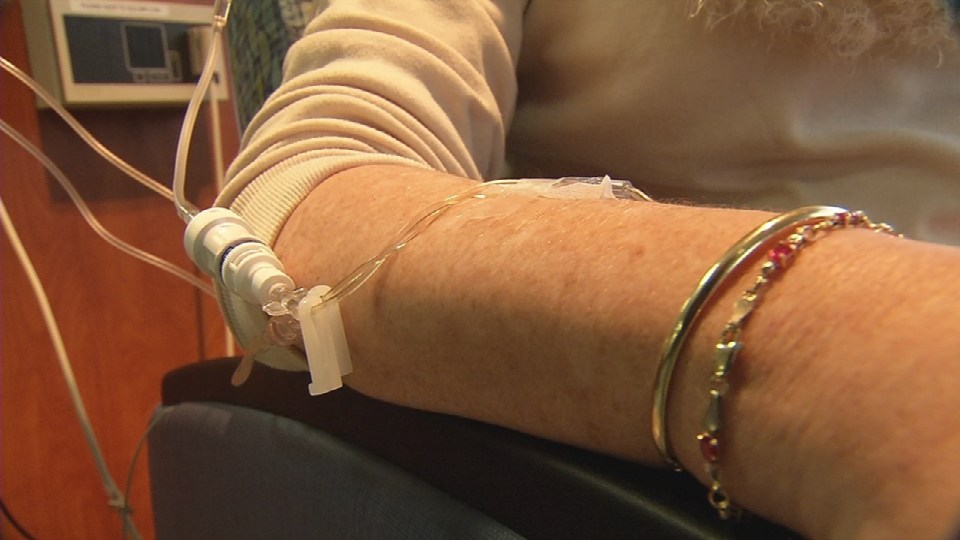Posted: Feb 29, 2016 10:46 PM EST Updated: Mar 01, 2016 8:30 AM EST
There's a new breakthrough that's sparking the hope and it's already saving lives.
A simple thing like a walk with her husband has become precious for Lauren Cordy. A year ago, the 32-year-old from Jeffersonville had just gotten engaged and seemed to have her entire life ahead of her, when she was dealt a very bad hand. She found out her melanoma, or skin cancer, diagnosed about a year earlier wasn't responding to her latest round of treatment.
"After, I think it was two or three months, we did a scan and found out it had spread, and it spread to my lung and my liver," Cordy explained.
Lauren had stage 4 melanoma -- a virtual death sentence.
"I thought, 'I'm early 30s, you know I don't have kids yet. I still have the rest of my life to live. Why me?' Why me, exactly," she said.
Then Lauren was given the newly-approved drug Keytruda, the latest weapon in what's seen as the biggest breakthrough in cancer treatment ever, called immuno-therapy. It allows immune cells, or T-cells, to hunt down and devour the cancer cells.
"With immune therapies, it turns out you're just engendering the immune system," James Graham Brown Cancer Center's Dr. Jason Chesney said. "You're training it to get activated against the cancer and a lot of the immune therapies we use, we don't have to continue. We can give them for three or four months, and then stop and watch the patient."
After just three months, Cordy's tumors were shrinking. After six months, she was cancer-free.
"Officially in remission since the middle of September," Cordy said. "Right after I got married I found out. So, September was a good month, yes."
It's the same story for 51-year-old Germantown resident Eddie Mitchell. After radiation and chemo, his melanoma disappeared, then returned -- spreading to his spleen and liver. His last resort was Keytruda.
"I have to admit, I was very skeptical at first, because I'd already been through one," Mitchell said. "And I was like, 'well let's just do whatever, and we'll see what happens.' But, in the back of my mind, I was like, 'Well this might not work either.'"
But it did. Within 6 months, Eddie also went from stage 4 to cancer-free.
"It really does blow your mind to think that, but for a little bit of time, the outturn could have been completely different," said Mitchell.
Time -- because, while the concept of immuno-therapy has been around for decades, researchers only recently discovered that immune cells can shut down. But new drugs like Keytruda and Opdivo keep that from happening. Whereas, just three or four years ago, 5-percent survived melanoma, that number is now near 70-percent. And that's just the beginning.
"It's led now to an explosion. And I would predict in five years, we're going to see a 25-percent reduction in cancer-related deaths in the United States as a result of it," Dr. Chesney said.
The James Graham Brown Cancer Center is developing a new drug to boost the fight against lung cancer, among which Kentucky holds the highest death rate in the nation. It's hoped that drug will increase the current 25-percent response among lung cancer patients to 50-percent or more.
"So the idea is to combine that drug that was developed here with these immune checkpoint inhibitors and see if we get a synergistic interaction and we can overcome the 40-percent response rate and make it a 100-percent response rate, and that's the holy grail," said Dr. Chesney. "With what I'm seeing today in melanoma and lung cancer, certainly with these immune checkpoint inhibitors, we're talking about 10 years."
But one big key to that, Dr. Chesney says, is increasing the participation in clinical trials, which stands at just 10-percent. He puts much of the blame for that on doctors, who he says are putting money above their patients.
"Clinical trials take a lot of time, and time is money. And the physicians can make a lot more money if they don't participate in clinical trials. But it's about doing the right thing," he said. "I don't believe a patient with any kind of cancer should die without having been treated with one of these agents."
The James Graham Brown Cancer Center currently has a long list of trials going on with these new drugs, involving several types of cancer. You don't have to have your doctor's OK to be a part of these trials.
One of the best parts of Keytruda and Opdivo are the minimal side effects.
The patients we talked with say they mainly felt fatigue for a day or two after their treatments.
For more information on the trials, click here.






0 comments:
Post a Comment